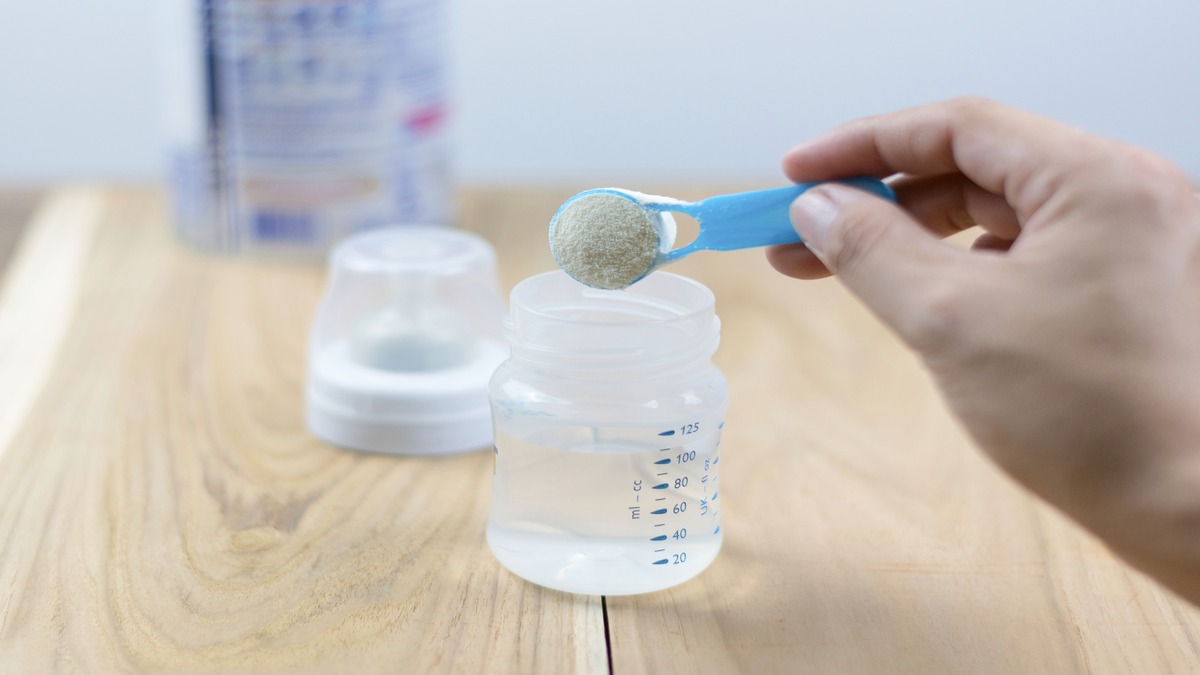What to know
- Cronobacter infections can be serious for infants.
- Learn steps to protect your baby if using powdered infant formula.

Overview
Cronobacter infections are rare, but they can be life-threatening in newborns. Infections in infants usually occur in the first days or weeks of life. Because Cronobacter infection can be dangerous for infants, it's important to take steps to prevent contamination of infant formula and feeding items.
Prevention tips
Below are steps you can take to help prevent your baby from getting sick with Cronobacter.
Breastfeed if you can
Very few cases of Cronobacter infections have been reported among infants fed only breast milk.
Clean, sanitize, and store feeding items safely
Germs can grow quickly if you add breast milk or formula to a partially used bottle or only rinse a used bottle, rather than clean it. You can help keep your baby's milk safe by
- carefully cleaning, sanitizing, and storing feeding items such as baby bottles, breast pump parts, nipples, caps, rings, valves, and other objects that may enter the baby's mouth, like pacifiers and teethers.
- taking apart bottles and breast pump equipment after use so you can clean them thoroughly.
Keep hands and surfaces clean
Before preparing and feeding bottles or food to your baby, it is important to start with clean hands and surfaces.
Wash your hands with soap and water for at least 20 seconds. If soap and water are not available, use a hand sanitizer with at least 60% alcohol. Check the product label to be sure. Wash hands with soap and water as soon as possible after using hand sanitizer. Hand sanitizer with at least 60% alcohol kills Cronobacter. But hand sanitizer does not kill all types of germs. It may not work as well if hands are visibly greasy or dirty. You should also wash your hands during these key times:
- Before touching your baby's mouth
- Before touching pacifiers or other things that go into your baby's mouth
- After using the toilet or changing diapers
Clean surfaces like countertops and sinks, with soap and water. You may also use a disinfectant wipe or paper towel sprayed with cleaning product.
Do not place feeding items or breast pump parts directly in the sink, because germs in sinks or drains could contaminate these items.
Prepare and store your formula safely
If you feed your baby with formula, consider using liquid, ready-to-feed (RTF) formula when possible, especially if your baby is at higher risk. Powdered infant formula is not sterile and might have germs in it. Liquid infant formula is made to be sterile (without germs). This means liquid formula should not make your baby sick with Cronobacter infection when you follow the instructions on the container.
You do not need to warm infant formula before feeding, but some people like to warm their baby's bottle. If you do warm the bottle, never use a microwave. Microwaves heat milk and food unevenly, resulting in "hot spots" that can burn your baby's mouth and throat. To warm a bottle, place it under warm running water.
- Keep the running water from getting into the bottle or on the nipple.
- Put a couple drops of infant formula on the inside of your wrist to make sure it is not too hot.
If you feed your baby with powdered infant formula, it is even more important to keep surfaces, feeding items, and your hands clean to prevent germs that can make your baby sick from getting into the formula container. Don't set the formula scoop on the counter, in the sink, or on any other surface. Keep lids and scoops clean and completely dry, and close containers of formula as soon as possible after using them. In most cases, it is safe to mix powdered infant formula following the manufacturer's instructions on the container.
If your baby is at higher risk, consider taking these extra steps to prepare your powdered formula):
Steps to take
- Boil water and let it cool.Let the water cool for no longer than 5 minutes. It is important to mix the formula while the water is still very hot so that the heat can kill any germs.
- Pour the hot water.Pour the hot water into a clean, empty bottle or feeding cup.
- Add the exact amount of formula.Add the exact amount of formula listed on the container while the water is still hot. Then, put a cap on the bottle and shake to mix. Don't use a spoon or other utensil to stir because this could introduce germs.
- Cool the formula to body temperature.Cool the formula to body temperature so it won't burn your baby's mouth. Hold the capped bottle under cool water or place it into an ice bath. Do not let the cooling water get into the bottle or on the nipple.
- Test the formula's temperature.Test the formula's temperature by putting a few drops on the inside of your wrist. It should feel warm, not hot.
Use prepared infant formula within 1 hour from start of feeding and within 2 hours of preparing it. Throw away any formula your baby does not finish. Don't refrigerate leftover formula to save it for later. The combination of the formula and your baby's saliva can allow germs to grow.
If you do not plan to start feeding your baby with the prepared formula right away, put it in the refrigerator immediately. Use formula in the refrigerator within 24 hours. Throw out formula if you can't remember how long you have kept it in the refrigerator. Do not feed it to your baby.
